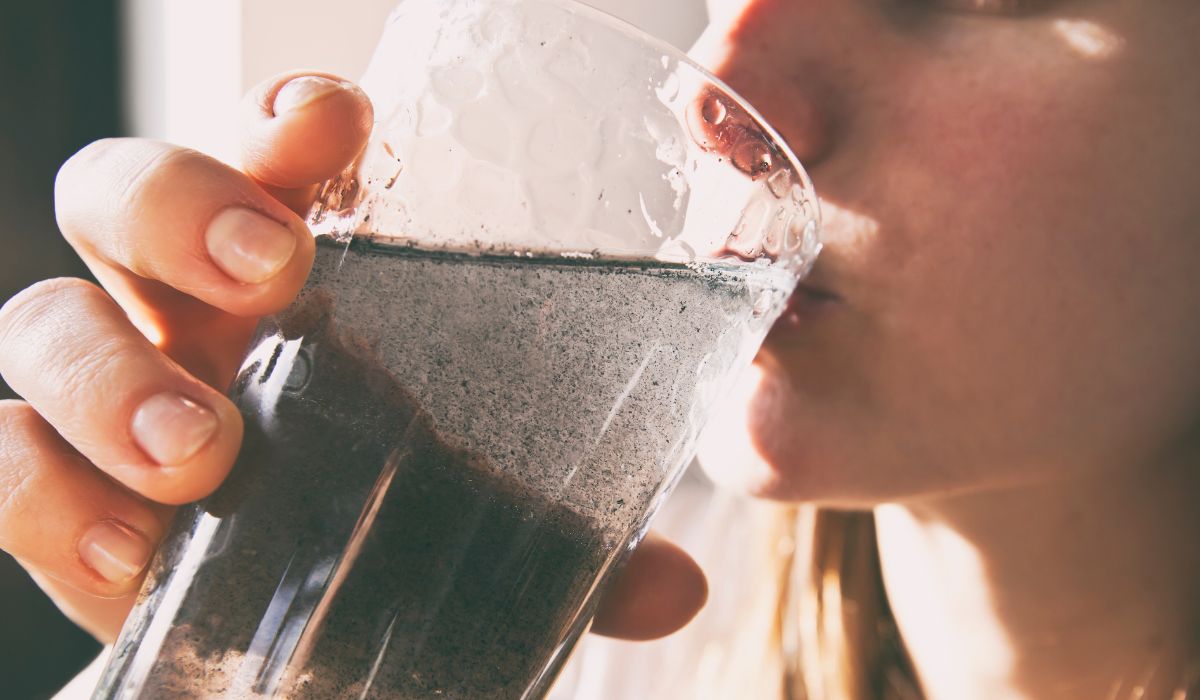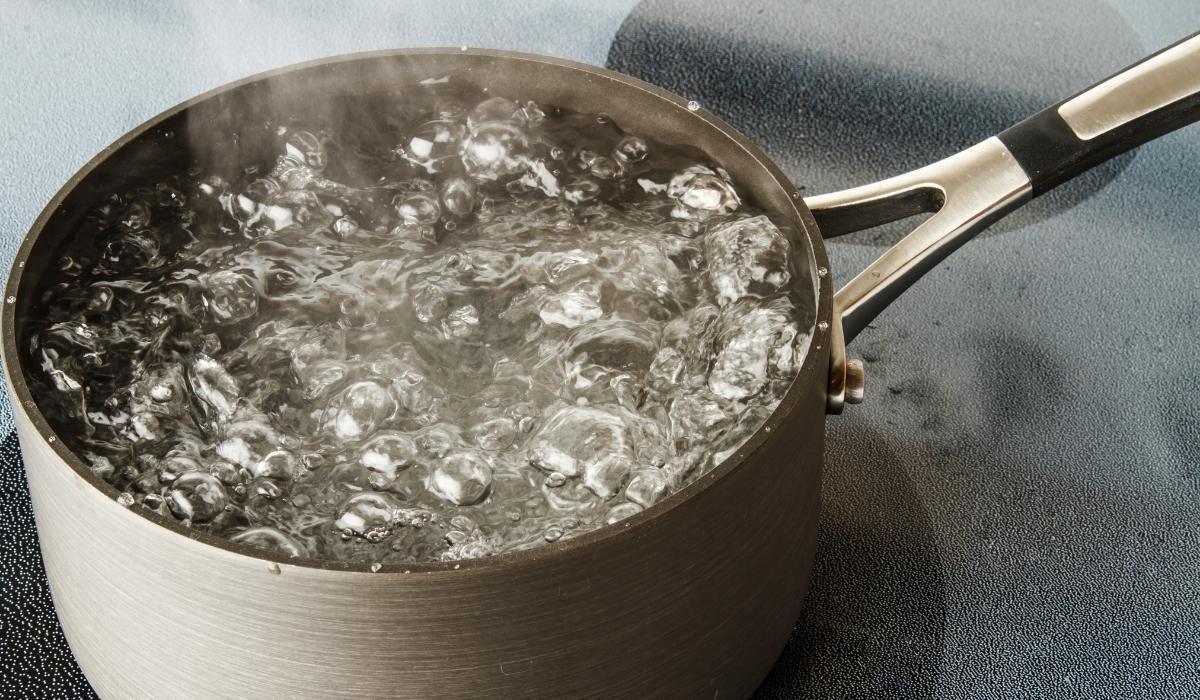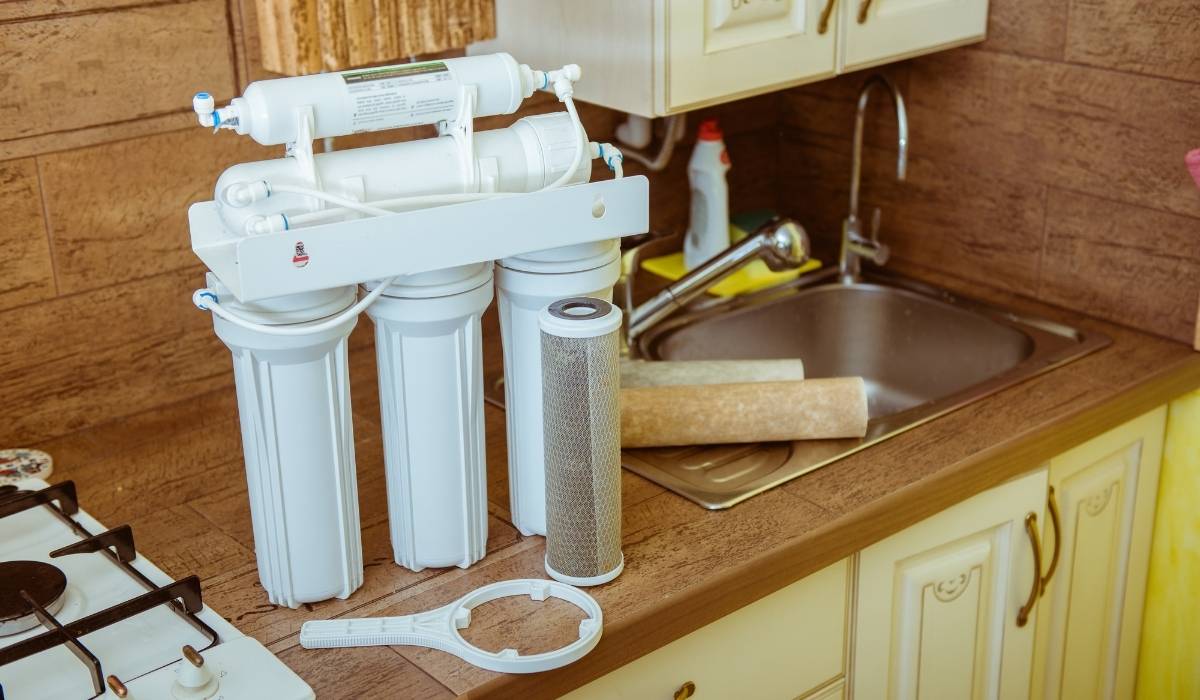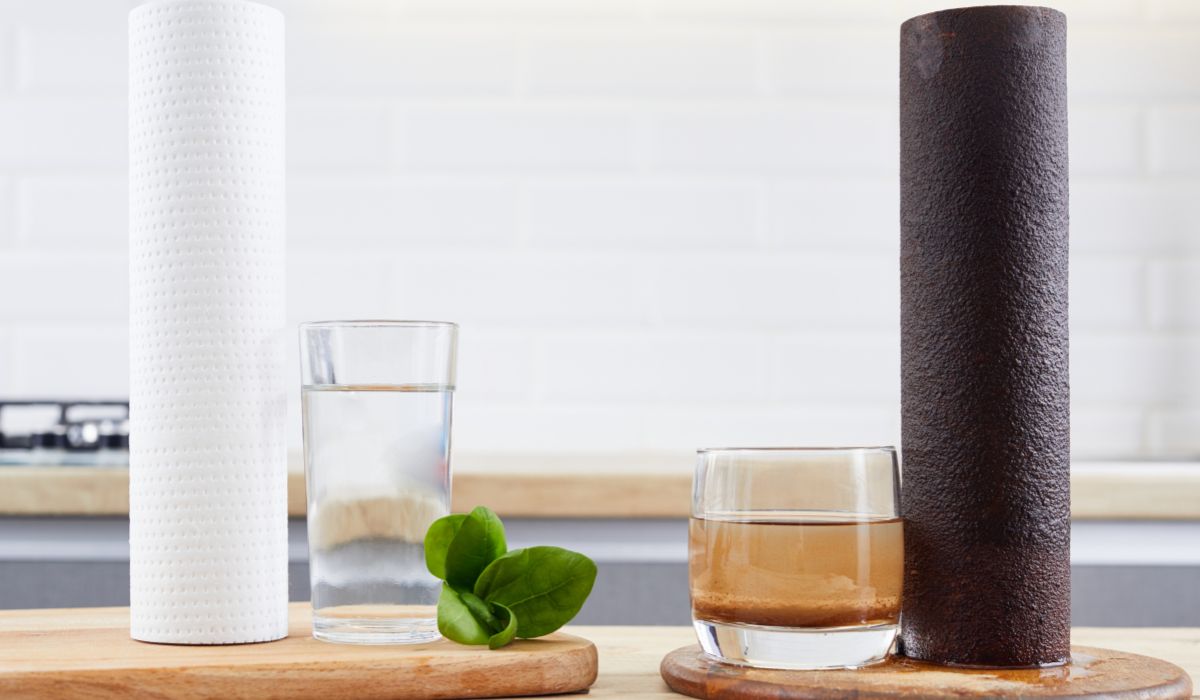You may have occasionally spotted black particles in your water, and you’re curious as to what must have caused it and why there are black particles in the water. Most of the time, black particles in drinking water are caused by iron or manganese in the water system.
These black specks in your water are not dangerous to ingest, despite the fact that they give your water a murky appearance and may stain your clean dishes, clothing, and plumbing fixtures.
However, the Environmental Protection Agency recommends a limit of 0.3 milligrams per liter for iron. However, this recommendation may have some little variations in some areas, depending on your local government or municipal
This article will comprehensively explain the most common reasons why there is black stuff in your water
6 Most Common Cause For Black Stuff In Your Water
There are several common reasons why there is black sediment in your water, which has made your water not as transparent as you would anticipate.I understand how inconvenient it can be when your faucet sends us undesirable particles like black sediments.
It’s annoying when your faucet emits undesired particles, like back residues in the bathtub. Well, there are explanations for this as well as alternatives to calling a plumber. Here are the common reasons for black stuff in water:
#1. Mineral Remains
Based on studies and much trusted research, it is revealed that iron and manganese are the most common causes of black particles in water systems.
These particles are likewise indigestible, but they give your water a murky appearance and can potentially stain your dishes, clothes, and plumbing fixtures.
To further calm your worries as a result of black specks in water, the Environmental Protection Agency also recommends a limit of 0.3 milligrams per liter for iron in your drinking water. This is still a recommendation, and it depends on whether your local government adopts it or not.
How to Fix Black Spec in Water Caused by Mineral Remains
To fix the black particles in the water caused by mineral remains of iron and manganese, I recommend having the water tested to ensure the mineral levels are safe.
Also, a good Reverse Osmosis Systems can solve this problem faster without spending a dime on a plumber.
Please talk to a professional plumber about other ways to filter your water to keep it clear.
#2. Deteriorating Rubber Parts
Sometimes, the presence of black particles in water that make your water appear murky or oily may be an indication that a rubber hose in your home’s plumbing system is broken or has worn out.
This kind of black fleck in water is traced to be caused by the addition of chlorine to water as a disinfectant in the rubber washers, gaskets, and hoses that are used to provide watertight connections; so when this materials deteriorates over time it may cause black spec in water
When this happens, you may need the service of a professional plumber to fix it for you by replacing the rubber components of the faucet.
How to Fix Black Spec in Water Caused by Deteriorating Rubber Parts
To fix the black stuff in the water caused by deteriorating rubber parts, I recommend first checking all of your water sources, such as the showers and sinks, to see if there are any black specks everywhere or just in one faucet.
If the black specks only come from one faucet, unscrew the head and inspect the washer inside. Replace the washer and faucet head to see if the black material goes away.
Secondly, if there is black stuff in the water that flows from several faucets in your home, there is more to do.
This could be the deteriorating supply hoses or the numerous worn-out washers and gaskets. In this case, you should talk to an experienced plumber to find the best way to solve your problem.
#3. Corrosion or Rusting Materials
Typically, wear and tears of the plumbing materials used in the water system cause rusting which leads to black stuff in the water.. The rust in your water may appear brownish-orange or sometimes even black.
These particles will originate from corroded steel or plumbing pipes and will be of varying shapes and sizes.
If your water consistently brings up rust particles, especially while running cold water, you should contact the municipal or local water authorities because the source could be the municipal supply.
Alternatively, if the problem is limited to one or two hot water faucets and gradually clears up after running for a while, this may indicate that your steel pipes are rusting.
In this instance, you would also want to have an experienced professional plumber inspect them prior to the problem escalating over time.
How to Fix Black Spec in Water Caused by Corrosion or Rusting Materials
To fix the black stuff in the water caused by corrosion or rusting materials, I recommend you call a plumber if you notice any signs of pipe corrosion to determine how much of your plumbing is compromised.
Corrosion in your piping is a significant problem, so if you notice black sediment in the water flowing from your home’s faucets, stop using it and don’t drink it, as lead may have gotten into your plumbing supply.
It’s possible that you simply require partial repiping, but if the corroded pipes caused any leaks or if the problem is widespread, it might be a major repair.
You can get a good Reverse Osmosis Systems and fix the problem as soon as you can to protect your family’s health and stop more damage to your home.
#4. Sand or Silt
Another common source of black stuff in your water is sand or silt that appears mostly in water that was gotten from a private well. They are typically brown or black sand or silt, which you may have observed in your water at least once or twice.
The water is not dangerous to your body, but it may cause your appliances, such as the washing machine or dishwasher, to wear out faster than usual.
Furthermore, the water could cause damage to your well pump. Some viable solutions to the issue of sand or silt in your water include
- Allowing the water to run for a few days if the well is fresh or new.
- Putting in a screen or installing a sandstone liner.
How to Fix Black Sediments in Water Caused by Sand or Silt
To fix black particles in water caused by sand or silt, you will undoubtedly need to increase the filtration in your plumbing system.
Although your system probably already has a filter, you’ll need something else to get rid of the tiny back sediments if the problem keeps coming back.
Also a good Reverse Osmosis Systems can solve this problem faster without spending a dime on plumber
And in such a case, I would recommend you contact an experienced plumber to avoid doing guesswork.
#5. Damaged Water Filters.
Many domestic water filters use a technique known as Granular Activated Carbon (GAC). So, these Granular Activated Carbon (GAC) filters use carbon to remove pollutants from water. As they age, they start to break down and release tiny carbon particles into the water.
The solution to this is to simply replace your filter on a regular basis to avoid seeing black specs in your water. Small, tap-based systems with easily replaceable filters do not require professional assistance.
If you are uncomfortable dealing with the filtration equipment and have a larger system, a professional will be able to handle it without a problem.
How to Fix Black Spec in Water Caused by Damaged Water Filter?
To fix the black spec in water caused by a damaged water filter, you will undoubtedly need to replace the filter to solve the problem.
From now on, If you don’t want to see granular activated carbon particles in your water again, I recommend you talk to a professional plumber about other options for water filtering in your house.
#6. Rusty Water Heater.
The water heater was made with some materials prone to corrosion, and when these parts of the water heater get rusted, the rust will go into your water.
If you only see the black residue in the bathtub when you use the hot water tap, it’s likely the water heater is rusted. This corrosion could also mean that your heater is about to break down.
Your water heater needs to be changed as soon as possible. If you don’t know what you’re doing, replacing a water heater can be dangerous, so hire a pro.
How To Fix The Rusty Black Particles In Water
To fix black particles in water caused by rusty water heaters, you will most likely need to replace your hot water heater entirely.
However, if your hot water heater is new, in such an instance, you will have to drain it and flush the lines, but in most situations, a replacement is required.
Hot and cold water Black Specks issues
When using a set water temperature, many homeowners only detect black specks in their water.
If you only detect these irritating black sediments when using hot or cold water, this can be a good sign of where the black specks are coming from.
When You Detect Black Stuff in Cold Water
If you only see black particles in your water when using cold water, the cause is most likely city pipe corrosion.
This is what commonly occurs when there is a citywide power outage. When water starts to flow again through the city’s pipes, many homes will usually see black stuff in their water.
If this is the case, call an experienced plumber to help resolve the issue of black particles.
When You Detect Black Stuff in Hot Water
If you notice black specks in your water just when you turn on the hot water, it could be due to city pipe corrosion, but it’s more likely that your home’s water heater is the source of the problem.
Metal particles from the interior of old rusted water heaters are transferred into the water and out through the pipes.
To remove the pollution from your water heater, you’ll need to have a plumber drain it entirely or get a replacement unit.
FAQs: Why Is There Black Stuff In My Water
What Is The Black Stuff In My Water?
The black stuff oozing from your faucet is likely bacteria feeding on oxidized water with high mineral levels. It could also signify mold, mildew, or deteriorating supply lines.
How Do You Get Rid of Black Stuff From Faucets?
Begin by determining the source of the problem. Consider installing a water softener or a filtered water system if the oxidation is caused by hard water.
Is Black Stuff In Water Harmful?
No, they’re not harmful to you. The black flecks could be traces of iron or manganese in the water. Despite their unusual appearance, these minerals are unlikely to cause harm. A water test can help you assess your water’s mineral composition.
Why Do I Get Black Sediments In My Tap Water?
You get black stuff in your water because of corroded pipes, so as these pipes age, they can discharge small pieces of worn-down piping into your water supply. These particles will appear more frequently when you turn on your water supply for the first time in a long time.
What Are Those Tiny Spots in Your Tap Water?
There are often two sorts of particles: white and tan, which are most likely calcium or magnesium carbonate, both of which are naturally found in hard water. They can also be flushed into your pipes from your water heater.
Why Does Black Residue Come From Faucets?
When oxygen reacts with hard water, a black residue forms. Bacteria is drawn to the water.
How Do You Remove Black Particles From Water?
To remove black particles from your water supply, replace the flexible water supply pipes and filters, or let the water flow out for a few days if you have a new well to get rid of the black specks.
Galvanized steel water pipes that have served the neighborhood for many years will need to be replaced. Water heaters over 15 years old will also need to be replaced.
What Causes My Water To Become Black?
The most common causes of water becoming black is the presence of magnesium, manganese, and iron in the water, all typical minerals that build up over time in your water system.
When these minerals oxidize or combine with oxygen as they exit your faucet, they can turn black, making the water in your faucet look black.
Conclusion
The black stuff in the water is a typical issue that can be resolved with the proper filter. If you notice black sediment in your well water, test it to determine what is causing the problem, and then install one or more filters to address the issue.
Ben Jordan has over 10 years of experience working in the water treatment industry and has a bachelors degree in water management. Water is his passion and in his free time he’s an aquarist that maintains large saltwater aquariums.




